
The exhibition at CRATE explored Lizzy’s particular affinity with whales - beings who produce highly treasured ambergris in their bowel, and whose beachings have been linked to the consumption of marine plastics.
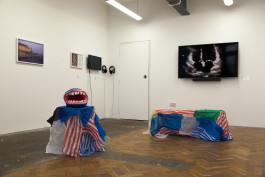
Whale Day, 2011
Lizzy Rose (b. 1988)
Digital C-Type print
Four photographs from a series of eight
The photo series Whale Day documents the Pegwell stranding of 2011, when a 45 foot sperm whale became stranded and eventually died on Pegwell Bay, Thanet.

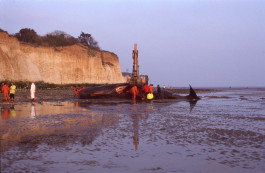


Sick, Blue Sea, 2018
Lizzy Rose (b. 1988)
Video, 00:10:34
The 2018 film Sick, Blue Sea, Lizzy’s final completed video work, explores nausea and environmental concerns through a tumblr blog narrated by a sick teenage sperm whale. It was shown alongside a set of accompanying pieces made by Lizzy and shown alongside the film when it was first shown: a ceramic whale platter, onto which were piled marshmallows made with ambergris; a papier-mâché sculpture of a wide open, cartoonish mouth with no eyes, ears or body; and gallery furniture covered in plastic bags.
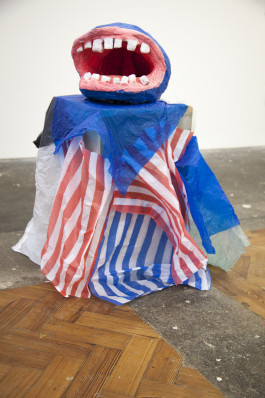
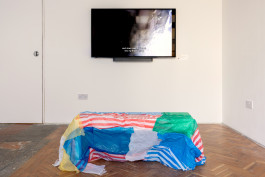
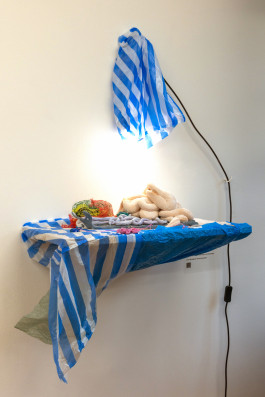
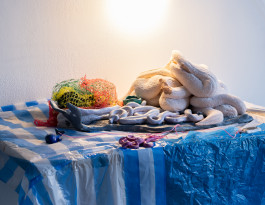
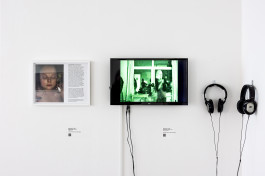
Bathtub Selfie, 2020-21
Lizzy Rose (b. 1988)
Digital print
Bathtub Selfie began life as an Instagram post to launch artist Abi Palmer’s book Sanatorium. Lizzy later showed the photo alongside the Instagram caption in the Turner Contemporary Open, her final exhibition prior to her death. The selfie shows Lizzy partially submerged in the bath, with flowers floating on the surface and an intravenous drip partially visible - a partial mirror to John Everett Millais’s Ophelia (1851-2), whilst the accompanying caption documents Lizzy’s struggles with her health, particularly the constant thirst she was unable to quench.
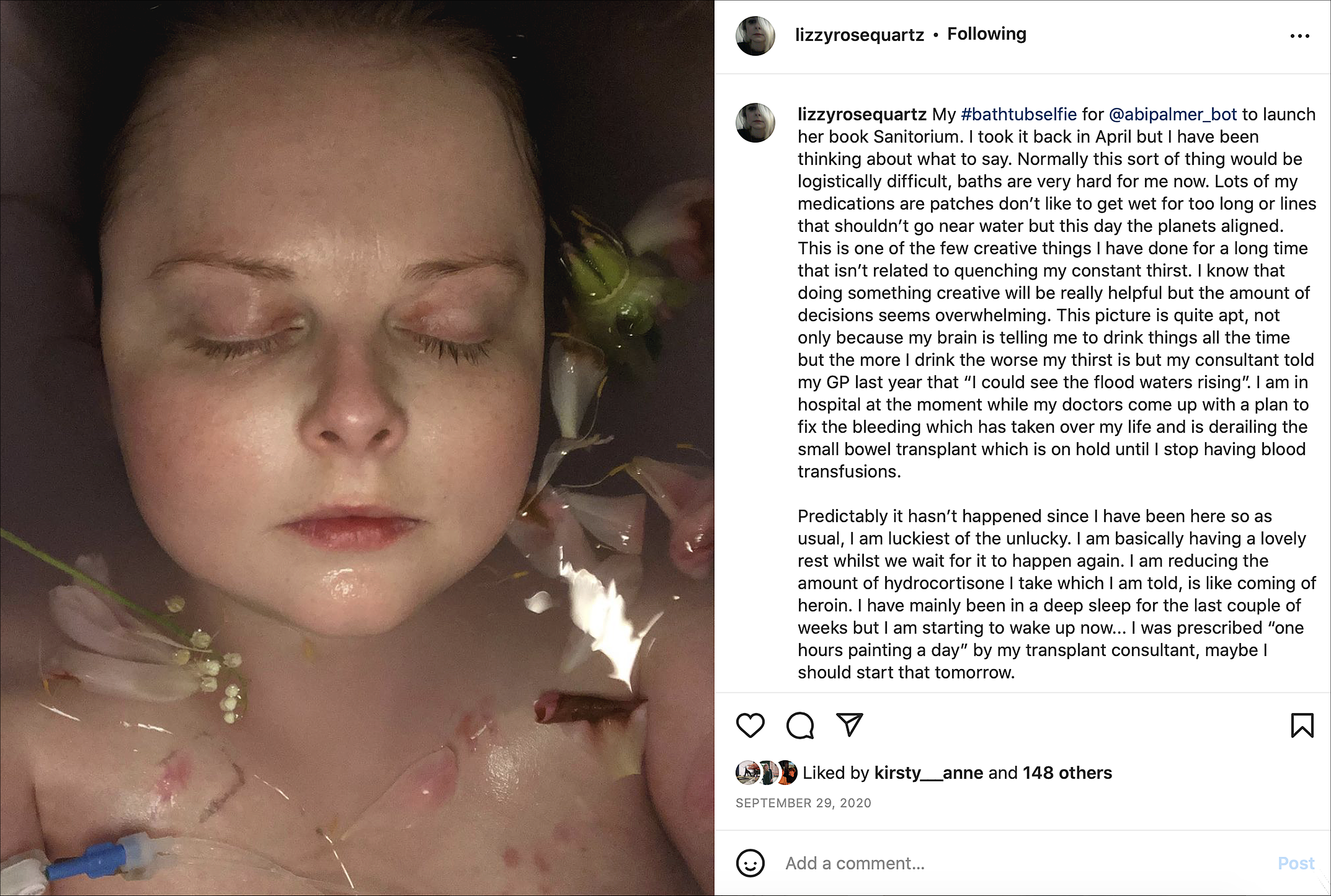
Feeling the Fantasy, 2015
Lizzy Rose (b. 1988)
Video, 00:03:46
Also at CRATE, for the first time, we show Lizzy’s 2015 video Feeling the Fantasy. Shown as a counterpoint to Bathtub Selfie, Feeling the Fantasy was one of the first works in which Lizzy incorporated her visibly ill body into the work. In the video, we watch Lizzy recreate a lip sync performance by the drag artist Lady Bunny in her flat dressed in a blue bubble wig and heavy drag make-up, in a nod to the online fan communities she was both fascinated by and embedded within. The exuberance of the dance routine is disrupted when, having finished the routine, Lizzy approaches the camera and removes her wig to reveal her head, hairless after chemotherapy.
Arrangement, 2017
Lizzy Rose (b. 1988)
Installation
Carpet moss, video, orchids, bench
Including the video Meaning of the Wild, 2017
Digital video 00:09:27
Arrangement is a transient and “imperfect” living environment which requires regular watering and for visitors and gallery staff to negotiate the space with care as they become part of a visible ecosystem.
The installation houses the video work The Meaning of the Wild, made following a trip Lizzy made to Japan to explore the art of Ikebana, which was supported by The Great Britain Sasakawa Foundation. Alongside the video, sculptural and floral arrangements are dotted amidst the moss. Lizzy compared her reliance on medical technology to being like a ‘plant kept in a pot’ and with Arrangement used her knowledge to focus us on the act of caring for complex and sometimes irrational systems, and showed us the potential for beauty in this act.
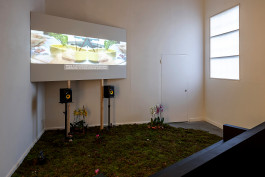
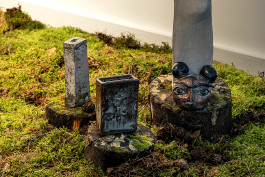
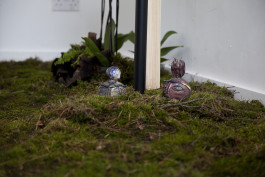
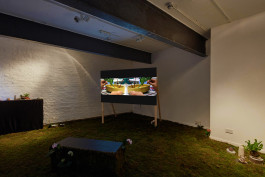
Electricity in the Stones, 2010
Lizzy Rose (b. 1988)
Video, 00:07:57
The give and take between the landscape and human efforts is further explored in the early film work Electricity in the Stones (2010), which documents a couple (played by Lizzy’s mother and stepfather) as they take a daytrip to explore the ruins of Romney Marsh, blurring the boundaries between the mystical and the everyday.
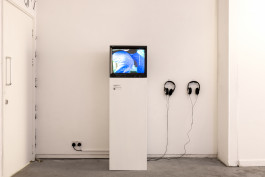
In the Studio: In Hospital, 2015
Lizzy Rose (b. 1988)
Floral arrangement
(Recreation of live-streamed performance)
Lizzy spent an increasing portion of her time in hospital from 2010. Determined to continue making work, she developed new strategies for thinking about how to turn the space she was in into one of making, thinking and sharing. The reconciliation of the hospital with the studio space became an ongoing project. For In the Studio: In Hospital (2015), Lizzy created a live video feed of flower arrangement from her studio in Margate as she underwent experimental hospital treatment January-March 2015.
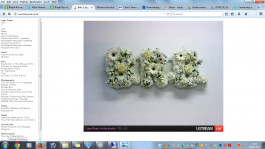
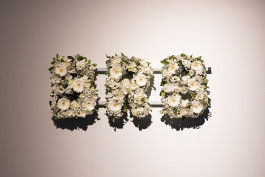
Black and White Studio, 2015
Lizzy Rose (b. 1988)
Installation
A partial restaging of 2015’s experimental installation, Black and White Studio, combines The Art of Driftwood Arrangement, a series of charcoal drawings of single pieces of driftwood, alongside stills and photographs from Lizzy’s video work exploring the ruin, highlighting Lizzy’s emerging interest in fragmentation and transformation.
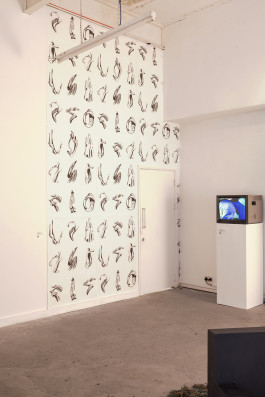
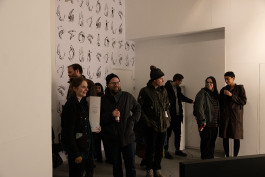
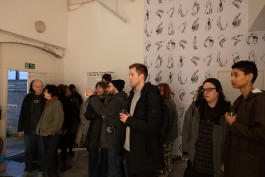
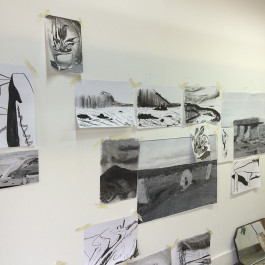

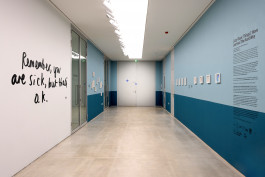
You meming about your illness is making me uncomfortable, 2014
Lizzy Rose (b. 1988)
Watercolour and pencil on cartridge paper
Four paintings from a series of six.
You Meming About Your Illness Is Making Me Uncomfortable (2014), explores Lizzy’s burgeoning interest in memes through a funny and provocative series of hand-painted versions of digital memes shared with the tag #chronicillness. These are the first works where Lizzy openly fused her identities as an artist and as a member of a hidden community of the ill who were just then finding voice through digital communities such as Tumblr.
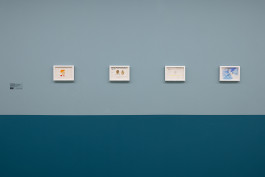
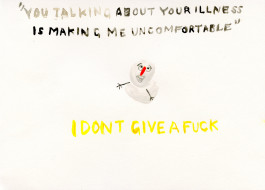
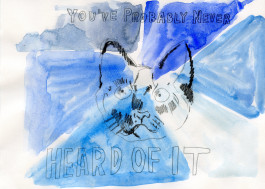
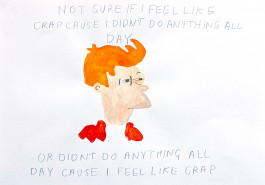
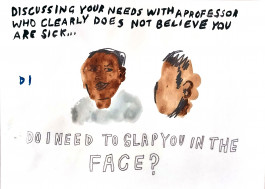
Exposing Trauma, 2016
Lizzy Rose (b. 1988)
Watercolour on paper
Two paintings from series of six
In Exposing Trauma (2016) Lizzy made a stark, powerful series of images of Crohn’s patients’ post-surgery selfies. For Lizzy this was an exploration of how this hidden illness could find universal expression with the aid of technology. These paintings accompany an essay written by Lizzy for the Dangerous Women project.
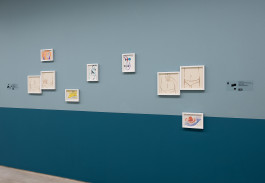
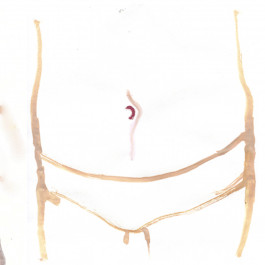
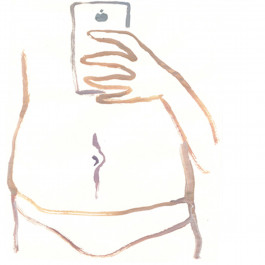
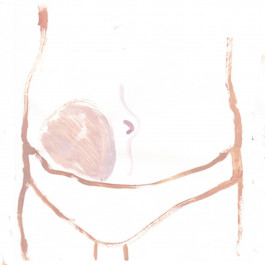
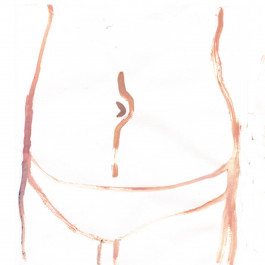
Hospital Watercolour Club, 2014
Lizzy Rose (b. 1988)
Watercolour and pencil on cartridge paper
Four paintings from a series of fourteen (Hand Sanitser, Alarm, Drip Hook, Lamp)
the series Hospital Watercolour Club made in 2013, the ward was recast as studio-and-still-life. Featuring contributions from Lizzy’s friends and visitors, Hospital Watercolour Club gently prods the visitor to consider where and when we think creativity can happen.
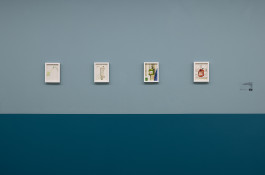
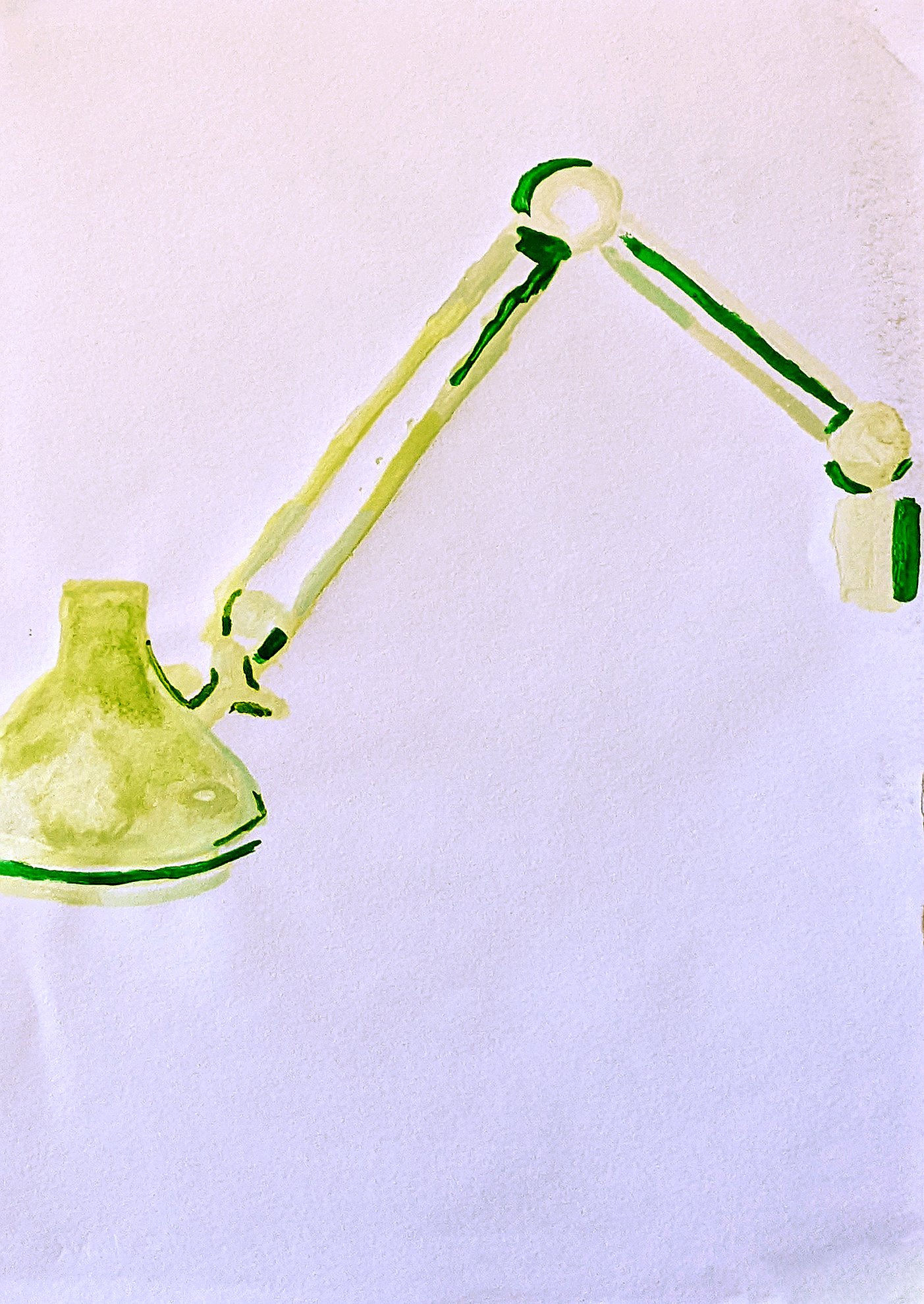
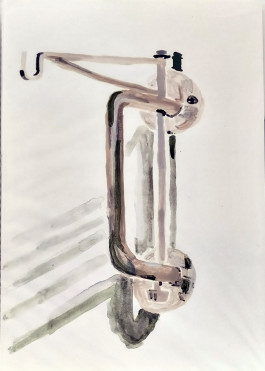
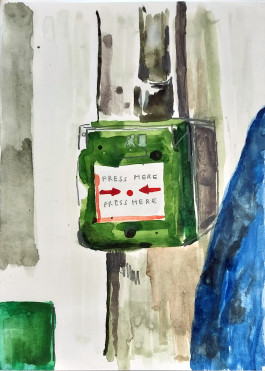
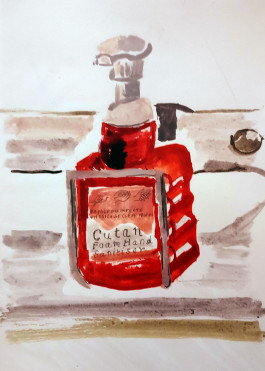
Untitled works, 2014-19
Lizzy Rose (b. 1988)
The exhibition at Turner Contemporary also includes several works on paper made whilst in hospital that have never previously been exhibited. These show more of Lizzy’s experimentation with the hospital as studio space and source of inspiration.
One of these works, Untitled (Remember, you are sick, but that’s OK, 2014), originally painted in Lizzy’s handwriting in bold, black ink on A3 paper, is scaled up and displayed directly on the gallery wall, reinterpreted as an affirmation and rallying cry.
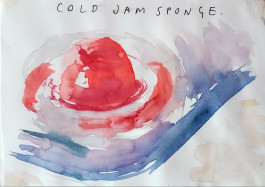
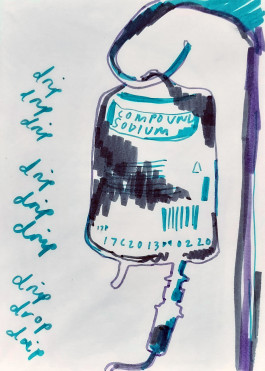
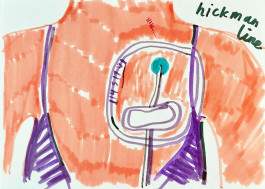
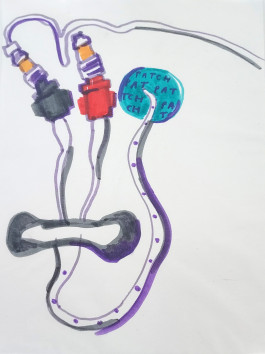
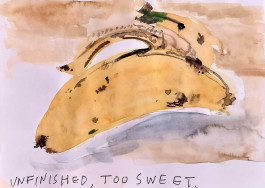
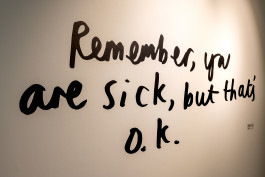
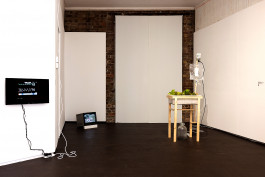
My Heart Will Go On, 2018
Lizzy Rose (b. 1988)
Video, 00:01:51
In the short film My Heart Will Go On (2018), a static camera records Lizzy’s heart monitor to the sound of Lizzy hesitantly playing the 1997 Celine Dion hit from Titanic on keyboard. The oxygen level monitor waveform appears to form a series of icebergs which speak to the realities of chronic illness: melodrama becoming rote, high bombast made fragile.
Lizzy wrote a short text for this piece:
"Beep beep. Downstream occlusion. Sharp scratch. There is a lady next door who giggles every now and then at nothing at all. Will other people’s visitors PLEASE stop using the ward commode as a chair? Non urgent, wait and see.
We’ll stay forever this way. You are safe in my heart and my heart will go on and on (and if it doesn’t beep beep beep). Normal pulse range 60-100 beats per minute. Normal respiratory rate 12-20 breaths per minute."
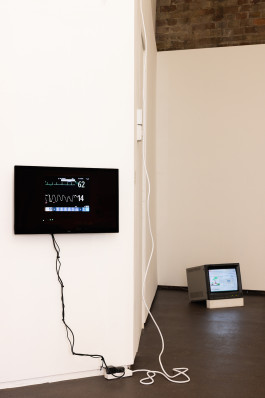
Intravenous Living Salad, 2018
Lizzy Rose (b. 1988)
TPN, infusion pump, hook, IV tubing, salad leaves, compost, plastic container, wooden frame
In Intravenous Living Salad (2018), Lizzy grew and sustained various salad leaves using the infusion system and total parenteral nutrition (TPN) that fed her in the latter part of her life. The salad was later eaten as part of a performance, Strong Currents, during Lizzy’s time at Open School East in Margate.
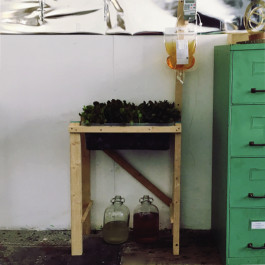
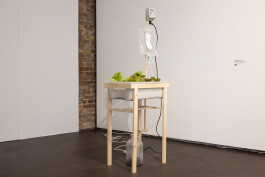
Fantasy Swimming Pools Series, 2008
Lizzy Rose (b. 1988)
Collage with photographs
Series of six
Fantasy Swimming Pools, a series of collages from 2008, is the earliest work featured in the exhibition. The series proposes outlandish flumes on the site of Margate’s old Lido complex. Lizzy identified strongly with the town and the sea. The awkward connection between human technologies and unruly nature found in this piece became a recurring subject of later works.
“I am very aware of myself as a creative and decaying form. My condition is creative, my condition is inflammatory; it creates tissue from inflammation which forms new cells. This in turn destroys the functionality of my body, reducing my body’s ability to perform vital functions.
“Technological (medical) intervention has taken over these vital functions I am losing, through this creative act of my body. I am fed artificially a mixture of nutrients and micronutrients, sugar and water which my body can no longer do for itself through my digestive system, much like a plant kept in a pot, slowly using up the nutrients in the soil and waiting to be fed. In this, I am dependent on mimicry of the human body by medical technology for life.”
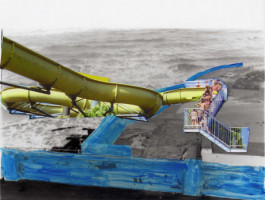
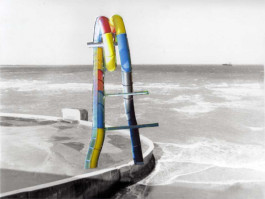
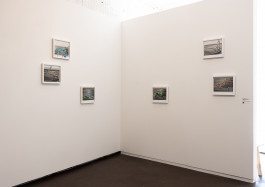
Valuables, 2008
Lizzy Rose (b. 1988)
Video slide show, 00:02:18
Valuables is a slide show juxtaposing photographs taken at a car boot sale with screengrabs of webpages showing the goods found in the boot fair photos for sale online. It is a tongue in cheek reflection on what we find valuable and what we find disposable, and a nod to Lizzy’s lifelong passion for car boot sales and the culture surrounding them.
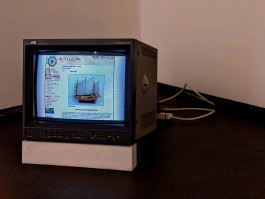
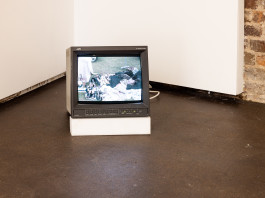
Untitled (A Machine That Beeps), date unknown
Lizzy Rose (b. 1988)
Vinyl transfer from 4 x A4 felt pen on paper drawings found in Lizzy's artworks folder
Untitled (A Machine That Beeps), a polemical felt-tip drawing, confronts visitors on their arrival to Well Projects. A list of “I want” or “I would like” statements, many about activities that the non-disabled take for granted (“I would like to put my clothes in the washing machine”) builds to a crescendo before cutting off mid-sentence, a glimpse into the overlooked frustrations shared by many chronically ill and disabled people.

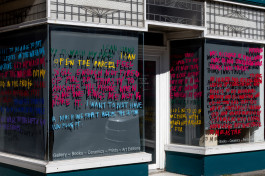
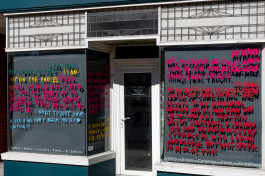
The exhibition at CRATE explored Lizzy’s particular affinity with whales - beings who produce highly treasured ambergris in their bowel, and whose beachings have been linked to the consumption of marine plastics.

Whale Day, 2011
Lizzy Rose (b. 1988)
Digital C-Type print
Four photographs from a series of eight
The photo series Whale Day documents the Pegwell stranding of 2011, when a 45 foot sperm whale became stranded and eventually died on Pegwell Bay, Thanet.




Sick, Blue Sea, 2018
Lizzy Rose (b. 1988)
Video, 00:10:34




The 2018 film Sick, Blue Sea, Lizzy’s final completed video work, explores nausea and environmental concerns through a tumblr blog narrated by a sick teenage sperm whale. It was shown alongside a set of accompanying pieces made by Lizzy and shown alongside the film when it was first shown: a ceramic whale platter, onto which were piled marshmallows made with ambergris; a papier-mâché sculpture of a wide open, cartoonish mouth with no eyes, ears or body; and gallery furniture covered in plastic bags.

Bathtub Selfie, 2020-21
Lizzy Rose (b. 1988)
Digital print
Bathtub Selfie began life as an Instagram post to launch artist Abi Palmer’s book Sanatorium. Lizzy later showed the photo alongside the Instagram caption in the Turner Contemporary Open, her final exhibition prior to her death. The selfie shows Lizzy partially submerged in the bath, with flowers floating on the surface and an intravenous drip partially visible - a partial mirror to John Everett Millais’s Ophelia (1851-2), whilst the accompanying caption documents Lizzy’s struggles with her health, particularly the constant thirst she was unable to quench.

Feeling the Fantasy, 2015
Lizzy Rose (b. 1988)
Video, 00:03:46
Also at CRATE, for the first time, we show Lizzy’s 2015 video Feeling the Fantasy. Shown as a counterpoint to Bathtub Selfie, Feeling the Fantasy was one of the first works in which Lizzy incorporated her visibly ill body into the work. In the video, we watch Lizzy recreate a lip sync performance by the drag artist Lady Bunny in her flat dressed in a blue bubble wig and heavy drag make-up, in a nod to the online fan communities she was both fascinated by and embedded within. The exuberance of the dance routine is disrupted when, having finished the routine, Lizzy approaches the camera and removes her wig to reveal her head, hairless after chemotherapy.
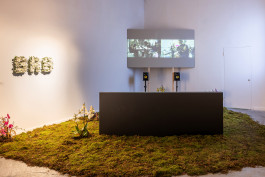
Arrangement, 2017
Lizzy Rose (b. 1988)
Installation
Carpet moss, video, orchids, bench
Including the video Meaning of the Wild, 2017
Digital video 00:09:27
Arrangement is a transient and “imperfect” living environment which requires regular watering and for visitors and gallery staff to negotiate the space with care as they become part of a visible ecosystem.
The installation houses the video work The Meaning of the Wild, made following a trip Lizzy made to Japan to explore the art of Ikebana, which was supported by The Great Britain Sasakawa Foundation. Alongside the video, sculptural and floral arrangements are dotted amidst the moss. Lizzy compared her reliance on medical technology to being like a ‘plant kept in a pot’ and with Arrangement used her knowledge to focus us on the act of caring for complex and sometimes irrational systems, and showed us the potential for beauty in this act.




Electricity in the Stones, 2010
Lizzy Rose (b. 1988)
Video, 00:07:57
The give and take between the landscape and human efforts is further explored in the early film work Electricity in the Stones (2010), which documents a couple (played by Lizzy’s mother and stepfather) as they take a daytrip to explore the ruins of Romney Marsh, blurring the boundaries between the mystical and the everyday.

In the Studio: In Hospital, 2015
Lizzy Rose (b. 1988)
Floral arrangement
(Recreation of live-streamed performance)
Lizzy spent an increasing portion of her time in hospital from 2010. Determined to continue making work, she developed new strategies for thinking about how to turn the space she was in into one of making, thinking and sharing. The reconciliation of the hospital with the studio space became an ongoing project. For In the Studio: In Hospital (2015), Lizzy created a live video feed of flower arrangement from her studio in Margate as she underwent experimental hospital treatment January-March 2015.

Black and White Studio, 2015
Lizzy Rose (b. 1988)
Installation
A partial restaging of 2015’s experimental installation, Black and White Studio, combines The Art of Driftwood Arrangement, a series of charcoal drawings of single pieces of driftwood, alongside stills and photographs from Lizzy’s video work exploring the ruin, highlighting Lizzy’s emerging interest in fragmentation and transformation.






You meming about your illness is making me uncomfortable, 2014
Lizzy Rose (b. 1988)
Watercolour and pencil on cartridge paper
Four paintings from a series of six.
You Meming About Your Illness Is Making Me Uncomfortable (2014), explores Lizzy’s burgeoning interest in memes through a funny and provocative series of hand-painted versions of digital memes shared with the tag #chronicillness. These are the first works where Lizzy openly fused her identities as an artist and as a member of a hidden community of the ill who were just then finding voice through digital communities such as Tumblr.





Exposing Trauma, 2016
Lizzy Rose (b. 1988)
Watercolour on paper
Two paintings from series of six
In Exposing Trauma (2016) Lizzy made a stark, powerful series of images of Crohn’s patients’ post-surgery selfies. For Lizzy this was an exploration of how this hidden illness could find universal expression with the aid of technology. These paintings accompany an essay written by Lizzy for the Dangerous Women project.





Hospital Watercolour Club, 2014
Lizzy Rose (b. 1988)
Watercolour and pencil on cartridge paper
Four paintings from a series of fourteen (Hand Sanitser, Alarm, Drip Hook, Lamp)
the series Hospital Watercolour Club made in 2013, the ward was recast as studio-and-still-life. Featuring contributions from Lizzy’s friends and visitors, Hospital Watercolour Club gently prods the visitor to consider where and when we think creativity can happen.





Untitled works, 2014-19
Lizzy Rose (b. 1988)
The exhibition at Turner Contemporary also includes several works on paper made whilst in hospital that have never previously been exhibited. These show more of Lizzy’s experimentation with the hospital as studio space and source of inspiration.
One of these works, Untitled (Remember, you are sick, but that’s OK, 2014), originally painted in Lizzy’s handwriting in bold, black ink on A3 paper, is scaled up and displayed directly on the gallery wall, reinterpreted as an affirmation and rallying cry.







My Heart Will Go On, 2018
Lizzy Rose (b. 1988)
Video, 00:01:51
In the short film My Heart Will Go On (2018), a static camera records Lizzy’s heart monitor to the sound of Lizzy hesitantly playing the 1997 Celine Dion hit from Titanic on keyboard. The oxygen level monitor waveform appears to form a series of icebergs which speak to the realities of chronic illness: melodrama becoming rote, high bombast made fragile.
Lizzy wrote a short text for this piece:
"Beep beep. Downstream occlusion. Sharp scratch. There is a lady next door who giggles every now and then at nothing at all. Will other people’s visitors PLEASE stop using the ward commode as a chair? Non urgent, wait and see.
We’ll stay forever this way. You are safe in my heart and my heart will go on and on (and if it doesn’t beep beep beep). Normal pulse range 60-100 beats per minute. Normal respiratory rate 12-20 breaths per minute."

Intravenous Living Salad, 2018
Lizzy Rose (b. 1988)
TPN, infusion pump, hook, IV tubing, salad leaves, compost, plastic container, wooden frame
In Intravenous Living Salad (2018), Lizzy grew and sustained various salad leaves using the infusion system and total parenteral nutrition (TPN) that fed her in the latter part of her life. The salad was later eaten as part of a performance, Strong Currents, during Lizzy’s time at Open School East in Margate.


Fantasy Swimming Pools Series, 2008
Lizzy Rose (b. 1988)
Collage with photographs
Series of six
Fantasy Swimming Pools, a series of collages from 2008, is the earliest work featured in the exhibition. The series proposes outlandish flumes on the site of Margate’s old Lido complex. Lizzy identified strongly with the town and the sea. The awkward connection between human technologies and unruly nature found in this piece became a recurring subject of later works.
“I am very aware of myself as a creative and decaying form. My condition is creative, my condition is inflammatory; it creates tissue from inflammation which forms new cells. This in turn destroys the functionality of my body, reducing my body’s ability to perform vital functions.
“Technological (medical) intervention has taken over these vital functions I am losing, through this creative act of my body. I am fed artificially a mixture of nutrients and micronutrients, sugar and water which my body can no longer do for itself through my digestive system, much like a plant kept in a pot, slowly using up the nutrients in the soil and waiting to be fed. In this, I am dependent on mimicry of the human body by medical technology for life.”



Valuables, 2008
Lizzy Rose (b. 1988)
Video slide show, 00:02:18
Valuables is a slide show juxtaposing photographs taken at a car boot sale with screengrabs of webpages showing the goods found in the boot fair photos for sale online. It is a tongue in cheek reflection on what we find valuable and what we find disposable, and a nod to Lizzy’s lifelong passion for car boot sales and the culture surrounding them.


Untitled (A Machine That Beeps), date unknown
Lizzy Rose (b. 1988)
Vinyl transfer from 4 x A4 felt pen on paper drawings found in Lizzy's artworks folder
Untitled (A Machine That Beeps), a polemical felt-tip drawing, confronts visitors on their arrival to Well Projects. A list of “I want” or “I would like” statements, many about activities that the non-disabled take for granted (“I would like to put my clothes in the washing machine”) builds to a crescendo before cutting off mid-sentence, a glimpse into the overlooked frustrations shared by many chronically ill and disabled people.


